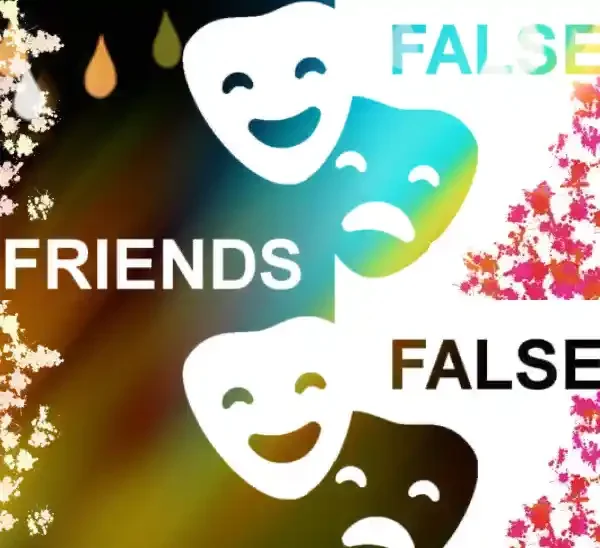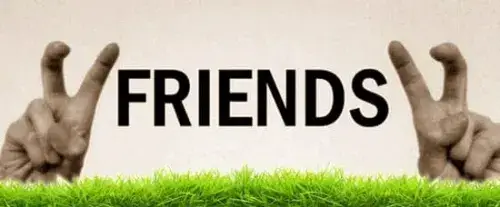Fake Friends, How to Recognize and Avoid Them. If you don’t have fake friends, consider yourself lucky. But are you sure none of your current friends are simply hiding their true intentions?
Life is a dynamic mosaic where people play a central role. We form relationships, build friendships, and seek genuine support.
However, not all relationships are what they initially seem. Fake friends are individuals who appear friendly but hide selfish motives or negative emotions behind their facade.
Such relationships can harm more than help, and this article will guide you in identifying them and understanding why distancing yourself is crucial.
Fake Friends, Who Are They?
Fake friends are like the dark side of the moon—initially dazzling and appealing, but over time, their selfishness, jealousy, or manipulation emerges behind the mask of kindness.
These individuals are not invested in your well-being or the strength of your friendship, their goal is often to meet their needs at your expense.
Ask yourself a vital question: Are the friends around me genuine, or am I living with people who don’t truly value me?
Types of Fake Friends and How to Spot Them.
The Careerist.
This type of person befriends you not for who you are but for your status or resources, such as your network or influence, often using the friendship to climb the career ladder.
Key Traits:
• Bases the friendship on your status or assets.
• Always present during your successes but absent in times of failure.
Fairweather Friends.
These companions are perfect for celebrations and vacations but disappear when you need help or emotional support.
Key Traits:
• Avoid responsibilities or problems.
• Make excuses when asked for support.
Fake friends, Critic.
This friend may appear observant and honest, but their hobby is pointing out your flaws and constantly criticizing you.
Key Traits:
• Provides destructive rather than constructive criticism.
• Leaves you feeling down rather than uplifted after interactions.
The Jealous One.
Jealousy often fuels fake friendships. These friends make seemingly harmless comments revealing envy, such as, “You’re so lucky,” or, “Your life always seems perfect.” This attitude can erode your self-esteem.
Key Traits:
• Persistent comparisons.
• Discomfort with your success, often masked as rivalry.
The Competitor.
This type sees your achievements as benchmarks to surpass. If you buy a new phone, they’ll get a pricier model; if you join a gym, they’ll strive for better results.
Key Traits:
• Constantly tries to outdo you.
• Builds the relationship on competition rather than support.
Fake friends, Manipulator.
Manipulative friends use emotional blackmail, play the victim, or employ other tactics to bend you to their will, always aiming to control situations for their benefit.
Key Traits:
• Exploits your emotions, making you feel guilty.
• Skillfully manipulates you to achieve their goals.
How to Avoid Toxic Friendships.
Evaluate the Friendship’s Quality. Ask yourself: Do you feel supported and understood, or are you merely being used?
If the friendship causes more stress than joy, set clear boundaries.
Express Your Feelings Honestly.
For instance, say, “I feel like our relationship has become one-sided.” There’s no need for a dramatic fallout—just a respectful distancing.
Stand Firm.
If a fake friend tries to persuade you to change your mind, remind yourself of the reasons behind your decision.
How to Find Genuine Friends?
Seek friendships that are healthy and lasting with these criteria:
• Honesty and Integrity: True friends remain reliable and honest regardless of circumstances.
• Shared Values: Similar beliefs and perspectives help forge deeper connections.
• Positive Influence: A good friend inspires and uplifts rather than undermines or envies you.
• Respect and Empathy: Friendship should be rooted in mutual respect, understanding, and a desire to help.
• Shared Interests: Common activities or hobbies strengthen bonds.
Why Distancing Yourself from Fake Friends is Crucial?
Fake friendships aren’t just inconvenient they can severely affect your emotional and mental well-being. Such friends can erode your self-esteem, create unnecessary stress, and even damage your ability to trust others.
Life is too short to spend it with people who don’t appreciate your true self. By choosing supportive and genuine friends, you’ll gain emotional stability and enrich your life with heartfelt, inspiring connections.
True friends stand by you through successes and failures. They respect your boundaries, share your joy, and support you when you need it most. Choose them wisely, and you’ll thrive.
Real-Life Stories- Lessons from Toxic Friendships.
Stories of betrayal and manipulation highlight the devastating cost of trusting fake friends. They serve as powerful reminders to evaluate relationships and recognize those who might exploit or harm your well-being.
Here are some illustrative examples:
A Friendship That Became a Disaster.
Anna trusted her childhood friend Marta and invested her life savings into their business venture. Marta, however, misused the funds, leaving Anna in debt and emotionally devastated.
Lesson: Even in close relationships, it’s essential to remain vigilant and set clear responsibilities.
A Friendship That Ruined a Marriage.
Jānis thought his life was perfect until he discovered that his best friend, Pēteris, was secretly pursuing his wife. The betrayal destroyed not only his marriage but also his trust in friendships.
Lesson: Fake friendships can cause irreparable damage.
Envy That Turned into Betrayal.
Laura shared her big career success with Ilze, who feigned happiness but secretly spread false rumors, damaging Laura’s reputation.
Lesson: Not everyone who smiles at your achievements is truly happy for you.
Recognizing a True Friend.
A Guide to Authentic Connection.
Understanding what constitutes a true friend is one of the most valuable insights you can gain in life. True friendship is not defined by the length of time you’ve known someone or the frequency of your interactions, but by the quality and depth of the relationship.
It is a mutually beneficial bond built on unwavering trust, respect, and emotional safety.
Core Pillars of True Friendship.
A genuine, lifelong friend will consistently exhibit a few fundamental qualities:
Unconditional Support and Acceptance: A true friend accepts you for who you are, flaws and all. They do not try to change you or judge you harshly for your mistakes.
When you succeed, they celebrate genuinely, and when you fail, they don’t say, “I told you so,” but rather, “How can I help you up?”
The Element of Trust.
Trust is the bedrock. You should feel completely safe sharing your deepest fears, secrets, and vulnerabilities without the fear of betrayal, ridicule, or having your private information weaponized later. A true friend guards your secrets as if they were their own.
Honesty, Even When It Hurts.
This is perhaps the most difficult, yet vital, quality. A true friend will be honest with you, even if the truth is uncomfortable or difficult to hear.
They will call you out on self-destructive behavior, not out of malice, but out of genuine care for your well-being. This is “tough love” delivered with kindness.
Consistency and Reliability.
Life gets busy, but a true friend shows up when it truly matters. You can rely on them to follow through on promises and be there during a crisis, even if it’s inconvenient for them. Their actions consistently match their words.
Mutual Respect for Boundaries.
They respect your personal space, time, and decisions, even if they disagree with them. A true friend never pressures you or attempts to control your life. They understand that you are two separate individuals with distinct needs.
The Test of Time and Crisis.
True friendship is often revealed most clearly during two key periods:
During Your Success.
Fake friends might become jealous or disappear when things are going exceptionally well for you. A true friend, however, feels genuine joy for your achievements and sees your success as an inspiration, not a competition.
During Your Crisis.
When you are at your lowest facing illness, financial trouble, or heartbreak a true friend will stand by you. They will offer practical help, a shoulder to cry on, and consistent encouragement without expecting anything in return. They are the ones who make the effort when others fade away.
If you have people in your life who embody these traits, nurture those connections. These are the true friends who add immeasurable value, stability, and joy to your life’s journey.
By learning to identify fake friends and safeguarding yourself against toxic relationships, you can protect your emotional, financial, and mental well-being.
True friendship is built on mutual respect, support, and honesty treasure it and let go of anything less.
You Good Day!




